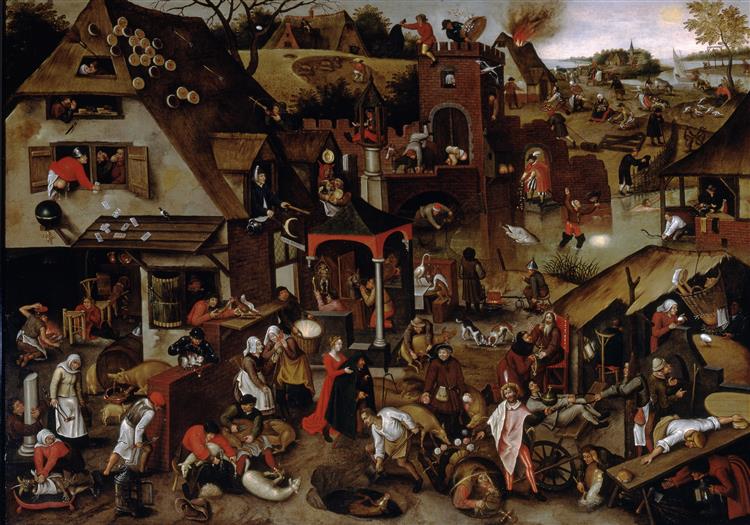Description
Pieter Brueghel the Younger's "Dutch Proverbs" is a fascinating testament to folk wisdom and wit, as well as a reflection of the culture of the Netherlands in the 16th century. Based on a theme already addressed by his father, Pieter Brueghel the Elder, this painting is a rich representation of more than a hundred Dutch proverbs, each of which is visualized through situations and scenes that capture the essence of everyday life and human behavior.
When looking at the painting, the first thing that stands out is its intricate composition. Not only is the work populated by a multitude of characters, but each of them acts as a vehicle to illustrate specific proverbs, offering the viewer an almost narrative experience. Despite the density of the scene, Brueghel the Younger achieves a balance that invites one to explore the painting in detail, discovering new visualized phrases at every turn. The use of space is masterful; the background, bustling with activity, does not compete with the rest of the work, but rather complements and enriches the meaning of each action depicted.
Color plays a critical role in this work. Brueghel the Younger uses a vibrant palette, full of warm, earthy tones that evoke rural life and nature. The characters’ clothing is strikingly colorful, from reds and oranges to greens and blues, adding a sense of vitality and energy to the scene. The characters’ facial expressions and postures reveal subtle emotions and transform the painting into a stage for human interactions. As a result, a direct connection is created between the viewer and the characters, anchoring the context of each proverb in shared human experience.
Thematic content, replete with symbolism, is one of the most significant features of "Dutch Proverbs." The multitude of scenes within the painting offer a visual feast of popular idiom, where each action translates into a life lesson. For example, the use of fishing as a metaphor is evident in one of the scenes, suggesting prudence and observation in daily decisions. The complex interrelationship between the different proverbs invokes a sense of community and collective wisdom.
It is interesting to note that while this work by Brueghel the Younger echoes many of the ideas represented by his father, his own artistic contributions are evident. The son enhances the depiction of the surroundings and details of country life, adding a level of depth and rhythm that subtly differs from the approach of Brueghel the Elder, who often delved into darker explorations of the human condition.
The painting is set in the broader context of Mannerism and Flemish art, where attention to detail and the depiction of everyday life become a vehicle for reflection on morality and ethics. The art of Brueghel, both the Elder and the Younger, transcends its time by inviting contemplation of human nature and behaviour.
In conclusion, Pieter Brueghel the Younger's "Dutch Proverbs" is a monumental work that not only invites aesthetic contemplation, but also functions as a valuable compendium of popular wisdom, encapsulating a diversity of proverbs that resonate through the centuries. Its composition, use of color, and depiction of characters offer the viewer deep access to the culture of its time and a space for reflection on the universal truths of the human condition.
KUADROS ©, a famous painting on your wall.
Hand-made oil painting reproductions, with the quality of professional artists and the distinctive seal of KUADROS ©.
Painting reproduction service with satisfaction guarantee. If you are not completely satisfied with the replica of your painting, we will refund 100% of your money.

